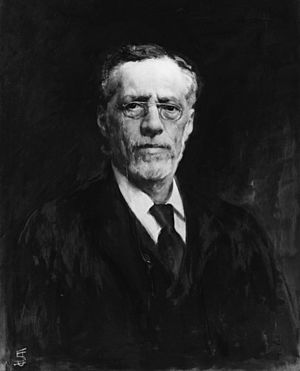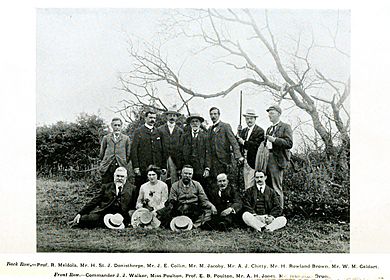Raphael Meldola facts for kids
Quick facts for kids
Raphael Meldola
|
|
|---|---|

Raphael Meldola, by Solomon Joseph Solomon
|
|
| Born | 19 July 1849 |
| Died | 16 November 1915 (aged 66) |
| Nationality | British |
| Alma mater | Royal College of Chemistry |
| Awards | Davy Medal (1913) |
| Scientific career | |
| Fields | Chemistry |
| Institutions | University of London |
Raphael Meldola was a clever British scientist. He was born on July 19, 1849, and passed away on November 16, 1915. He was known for his work as a chemist (someone who studies chemicals) and an entomologist (someone who studies insects). He even became a professor of organic chemistry at the University of London.
Contents
Early Life and Education
Raphael Meldola was born in Islington, London. His family had a long history, as he was related to another famous Raphael Meldola. This earlier Raphael Meldola was a religious leader for the Spanish and Portuguese Jews in London.
Raphael Meldola was the only son of Samuel Meldola. Later in 1886, he married Ella Frederica Davis. He studied chemistry at the Royal College of Chemistry in London.
A Career in Science
Meldola worked in a private lab with another scientist named John Stenhouse. In 1872, he became a lecturer at the Royal College of Science. He also helped Norman Lockyer with his studies of light, called spectroscopy.
In 1875, Meldola led a British team to the Nicobar Islands. They went there to study a solar eclipse. Later, he became a professor of chemistry at the Technical College in Finsbury in 1885.
Joining Scientific Groups
Meldola was a member of many important science groups. He was a Fellow of the Royal Astronomical Society, which studies space. He was also a Fellow of the Institute of Chemistry.
He joined the Chemical Society in London and Berlin. He was also a member of the Pharmaceutical Society. He was part of groups like The Geologists Association and the Royal Anthropological Institute.
Important Roles and Awards
In 1886, Raphael Meldola was chosen to be a Fellow of the Royal Society. This is a very high honor for scientists. Even Charles Darwin, a famous naturalist, suggested him for this award.
Meldola received the Davy Medal in 1913 for his important work in chemistry. From 1914 to 1915, he was the Vice-President of the Royal Society.
He led several scientific societies as their president:
- The Royal Entomological Society from 1895 to 1897.
- The Chemical Society from 1905 to 1907.
- The Society of Dyers and Colourists from 1907 to 1910.
- The Society of Chemical Industry from 1908 to 1909.
- The Royal Institute of Chemistry from 1912 to 1915.
He was also the first president of a group called the Maccabaeans. Today, the Royal Society of Chemistry gives out the Meldola medal every year to honor him.
Studying Mimicry
Raphael Meldola was very interested in nature. He spent five years studying mimicry in butterflies. Mimicry is when one animal looks like another to protect itself.
He was inspired by Charles Darwin's book, On the Origin of Species. Meldola's work helped show how natural selection works through animal colors. Another scientist, Edward Bagnall Poulton, thanked Meldola for his help.
Discovering a New Dye
Meldola also made an important invention. He discovered a special synthetic dye. This dye is still known today as Meldola's Blue.
 | Sharif Bey |
 | Hale Woodruff |
 | Richmond Barthé |
 | Purvis Young |


